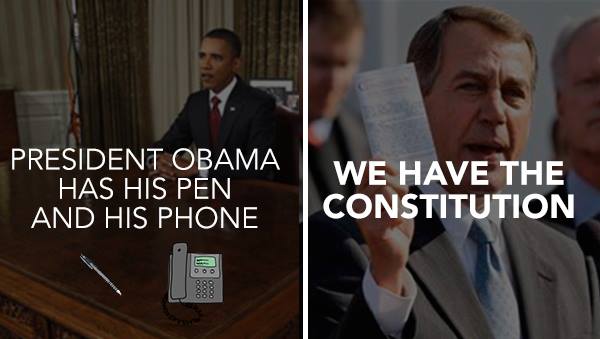Congress moved on two fronts Thursday to test the limits of presidential authority, with a surprising maneuver in the Senate to begin debating President Obama’s war powers against the Islamic State and a vote in the House to prohibit him from enforcing his executive action on immigration.
With the two parties in a perpetual state of dispute, the actions represented a rare, if unplanned, shared view among liberals and conservatives: Through Congress’s passivity or its inability to compromise, it has ceded too much authority to an executive branch more than willing to step into the void.
Mr. Obama has angered Republicans on Capitol Hill by announcing that he would use his executive authority to shield millions of undocumented immigrants from deportation, a decision conservatives condemn as an abuse of his constitutional powers. And lawmakers in both parties have rebuked the president for executing a war in the Middle East that many believe has not been properly authorized by Congress.
The simultaneous moves in the two chambers demonstrated a strong desire to wrest some of that power back.
“The executive gets more powerful the more dysfunctional Congress gets,” said Senator Christopher S. Murphy, Democrat of Connecticut, who supported forcing a vote to revisit the president’s war authority. “So there’s a natural transition of power away from the legislature to the executive when nothing can happen here.”
The action on Capitol Hill focused on two of the most urgent and divisive issues of the moment — immigration and war policy — and foreshadowed the kinds of debates likely to dominate the new Congress after it is sworn in next month. Adding more volatility to the mix will be the frenzied politics of a presidential campaign, which is likely to feature several members of Congress.
The dynamics of the 2016 campaign were on display as senators on the Foreign Relations Committee unexpectedly found themselves confronting the question of war against the Islamic State.
It began with procedural sleight of hand by Senator Rand Paul of Kentucky, who is expected to seek the Republican nomination for president and has positioned himself as a less hawkish alternative to the other potential candidates in his party.
 |
| READ Paul's War Resolution |
Mr. Paul used a routine meeting over an unrelated issue — clean water — to force his colleagues to schedule a vote on authorizing force against the Islamic State. The committee agreed to move forward, though only after dissent from Republicans like Senator John McCain of Arizona who take a more traditional interventionist approach. Mr. McCain called Mr. Paul’s proposal, which would prohibit the use of ground forces in most cases and set strict time limits on the conflict, “crazy.”
A vote, on either Mr. Paul’s plan or a similar one, could happen as early as Tuesday. If a plan is approved, it would get a floor vote before the end of the year if Majority Leader Harry Reid agreed to put it at the top of a crowded Senate calendar.Read the rest of the story HERE.
If you like what you see, please "Like" us on Facebook either here or here. Please follow us on Twitter here.





No comments:
Post a Comment